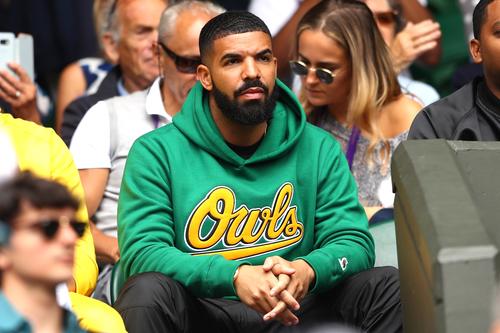
Another album, another round streaming and chart records broken. On day one, Scorpion both Spotify and Apple Music's records for most album streams in a single day. In its first week out, it Post Malone's beerbongs & bentleys's first week streaming numbers, which were 2018's highest. It's also the to ever be streamed over a billion times in one week. Just yesterday, Drake The Beatles' previous record most songs in the Top 10 Billboard's Hot 100, landing seven album cuts in the top tenth the chart.
Even with streaming records now being notorious for how ten they're broken, Drake's still undeniably one the biggest— if not the biggest— artists in the world. He's certainly been the most popular rapper alive for at least five years now. For Joe Q. Public, that's huge. But for more discerning rap listeners, Drake's level popularity is less important. What matters more is how he got there— namely by pulling hip hop into his orbit with a cutting-edge sound and staying out in front trends for years on end. Trap? Dancehall? Nostalgia for the '90s sounds Memphis and Houston? Drake was on those before the vast majority other rappers.
With 2009's So Far Gone and 2010's Thank Me Later, Drake and go-to producer Noah "40" Shebib took cues from 's chilly 808s & Heartbreak while adding their own emotive spin, creating a template that'd define a good deal early 2010s hip hop. On Take Care, they expanded it, roping in the soon-to-be-influential sounds T-Minus and collaborators and Doc McKinney. Nothing Was the Same paved the way for , DJ Dahi, and Sampha's respective breakouts. If You're Reading This It's Too Late and What a Time to Be Alive both proved Drake could do trap as well as anyone else from outside Atlanta. While Views and More Life were critically maligned, they both capitalized on the dancehall/afrobeat trend.
Scorpion doesn't really have anything bracingly new on it, which has usually been Drake's calling card. Call him a vulture all you want, but curation's always been his number one skill, and his ability to inhale trends and exhale music that's still recognizably his own, is what's kept him afloat all these years. He may outsource his most memorable beats and rhymes, but he usually looks pretty damn savvy doing so.
Drake spends most his time on Scorpion looking backwards, at least sound-wise. The first half, which leans more heavily on rapping, has more beats than usual that recall his backpacking, pre-So Far Gone days, such as rappity-rap intro track "Survival," soul-stomping "Emotionless," and consecutive tracks produced by '90s legends and DJ Paul. The R&B-focused Side B has virtually none the refreshing, forward-thinking characteristics the similarly-styled tracks on Nothing Was the Same. Especially when Drake hits the one-two punch the "Hold On, We're Going Home" redux "Don't Matter to Me" and the '90s-reverent "After Dark," you start to wonder whether this guy really holds the compass to hip hop's future any more.
There are some exceptions. "Nice For What" and "In My Feelings" take a genre that's rarely touched by any mainstream contemporary rappers— New Orleans bounce music— and does it surprisingly well, albeit without adding much in the way updates. The latter song could even serve as an argument against this exact piece— the viral challenge spurred from Shiggy's dance moves to "In My Feelings" shows there is still Drake clout to be found on social media pages. Early highlight "Nonstop" makes very conspicuous use a producer tag that's been a fixture on up-and-coming rappers' projects this year, namely Tay Keith, the Memphis upstart who Drake first worked with on his and BlocBoy JB's "Look Alive." The 40-helmed "Peak" and "Summer Games," while not sounding futuristic, do touch on some divergent sonic territory for Drake, fering a new look for the moody soundscapes he's alway favored.
Even if social media remains a popping place for Drake (and that's more thanks to Shiggy and Odell Beckham Jr. than ChampagnePapi himself), Scorpion just doesn't feel like something that'll influence the next generation rappers. Most that has to do with its sound, but part it has to do with Drake's attitude on it. Accompanying the album was an "editor's note" from Drizzy himself:
Though written in a joking tone, it's the sort self-deprecating humor that's usually delivered by someone who feels cornered. It's similar to Kanye's "I Love Kanye" interlude on The Life Pablo, and we all now know his low, desperate mental state around the time that album's creation. Drake simply doesn't feel as confident anymore, and that spills over into paranoid, embittered lyrics on Scorpion, defensive about his son and frustrated at the rest rap. The Drake old was comfortable ignoring the rest hip hop and carving out his own world. He thinks the problem is peoples' perception him as a fake, but the real problem is the most popular rapper in the world thinking that there's any sort problem at all.
Despite the seemingly carefree attitude everyone who has it, "clout" doesn't come naturally, that's a myth. Drake developed his clout through years fine-tuned listening, paying attention to rap trends, and a dedication to his own craft. After a few albums seemingly trying too hard to appease perceived naysayers, is Drake in danger losing it?
